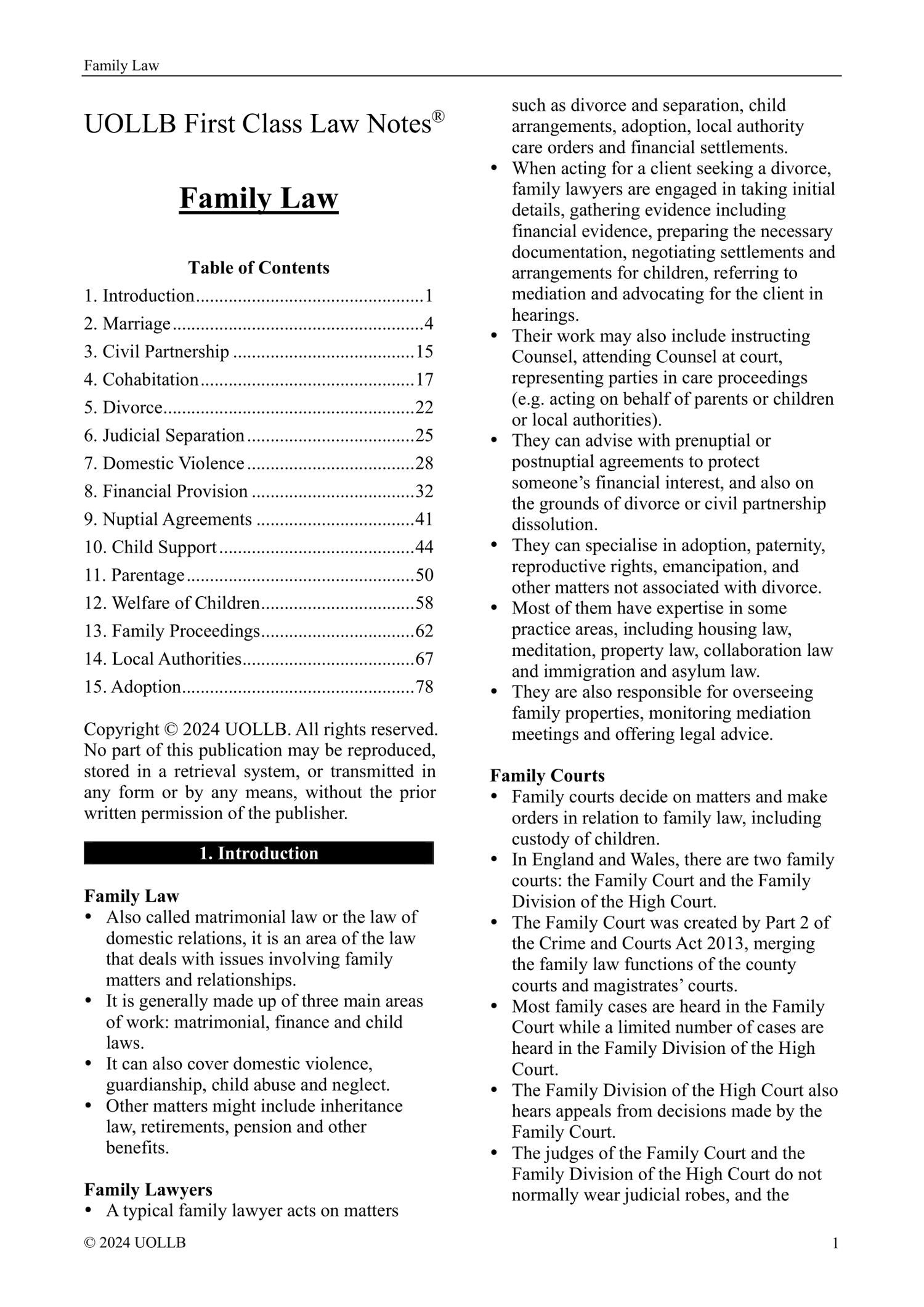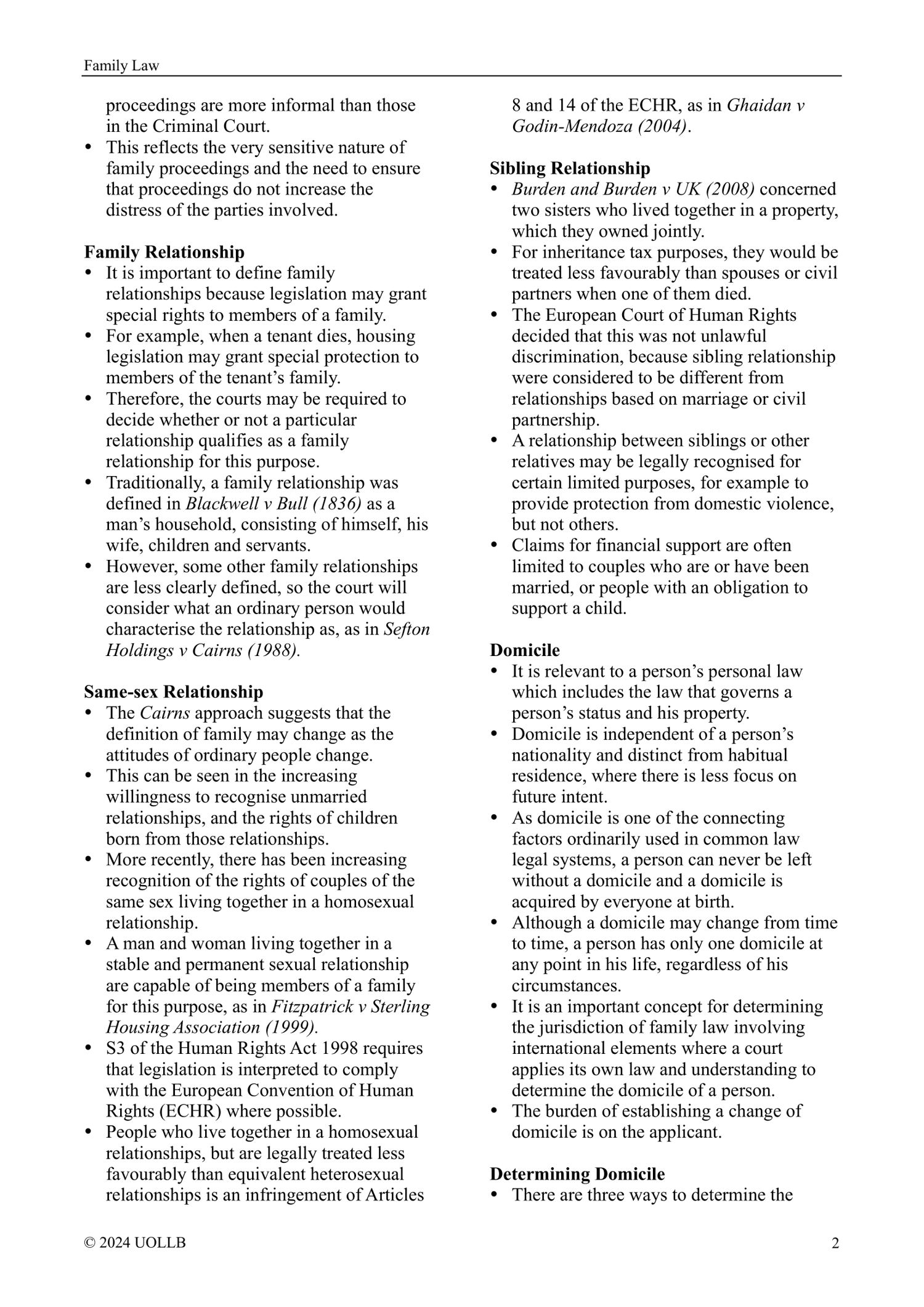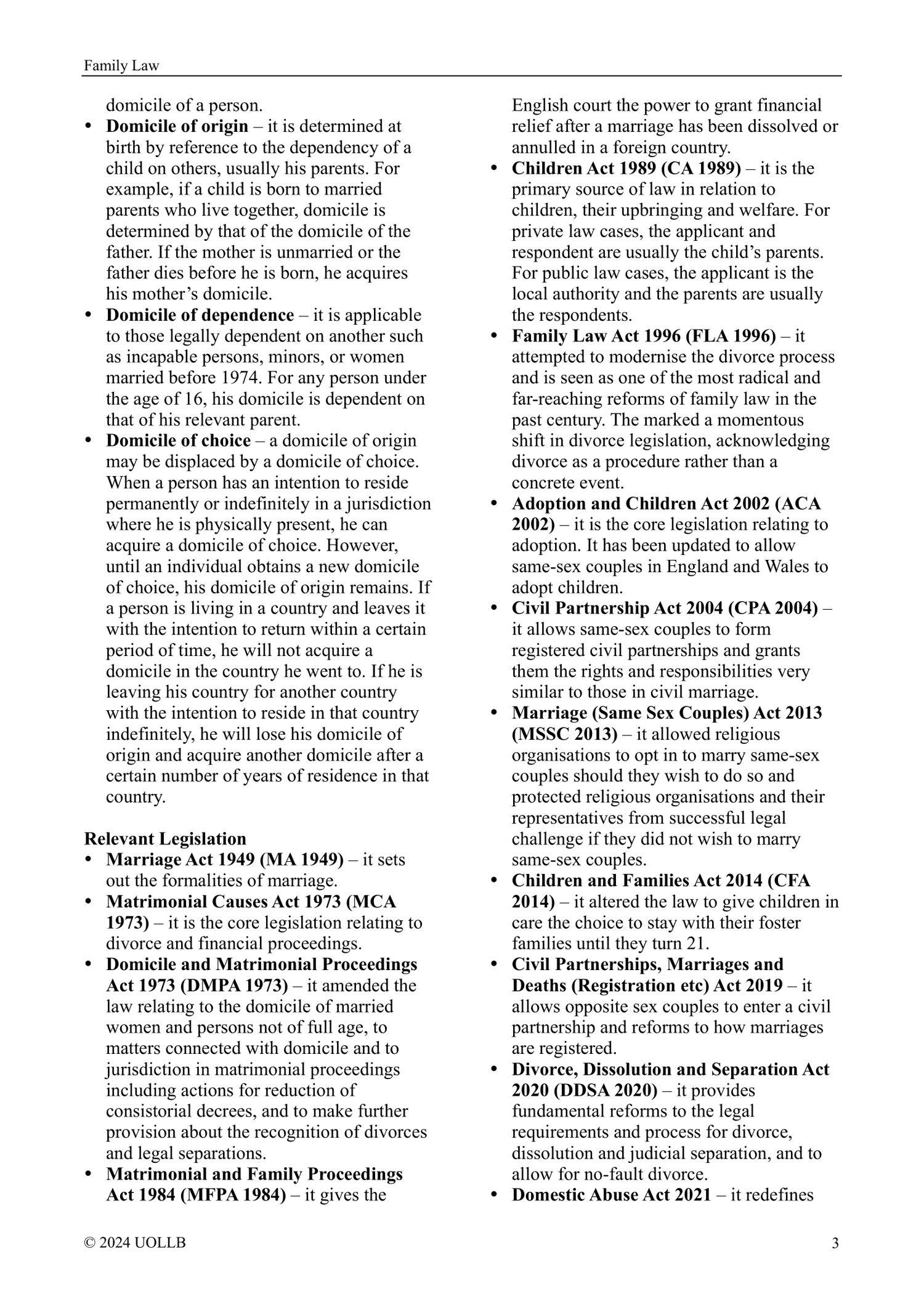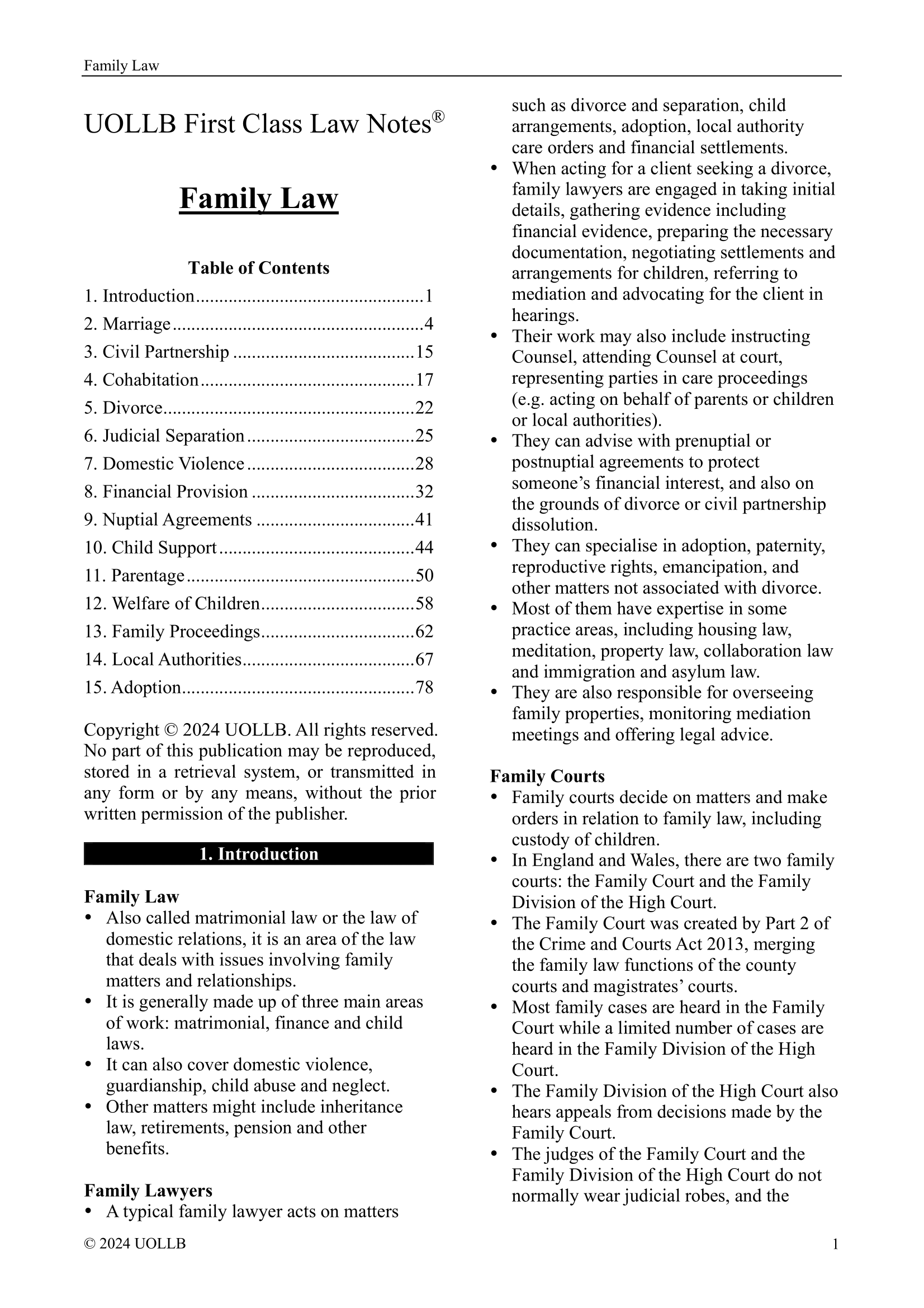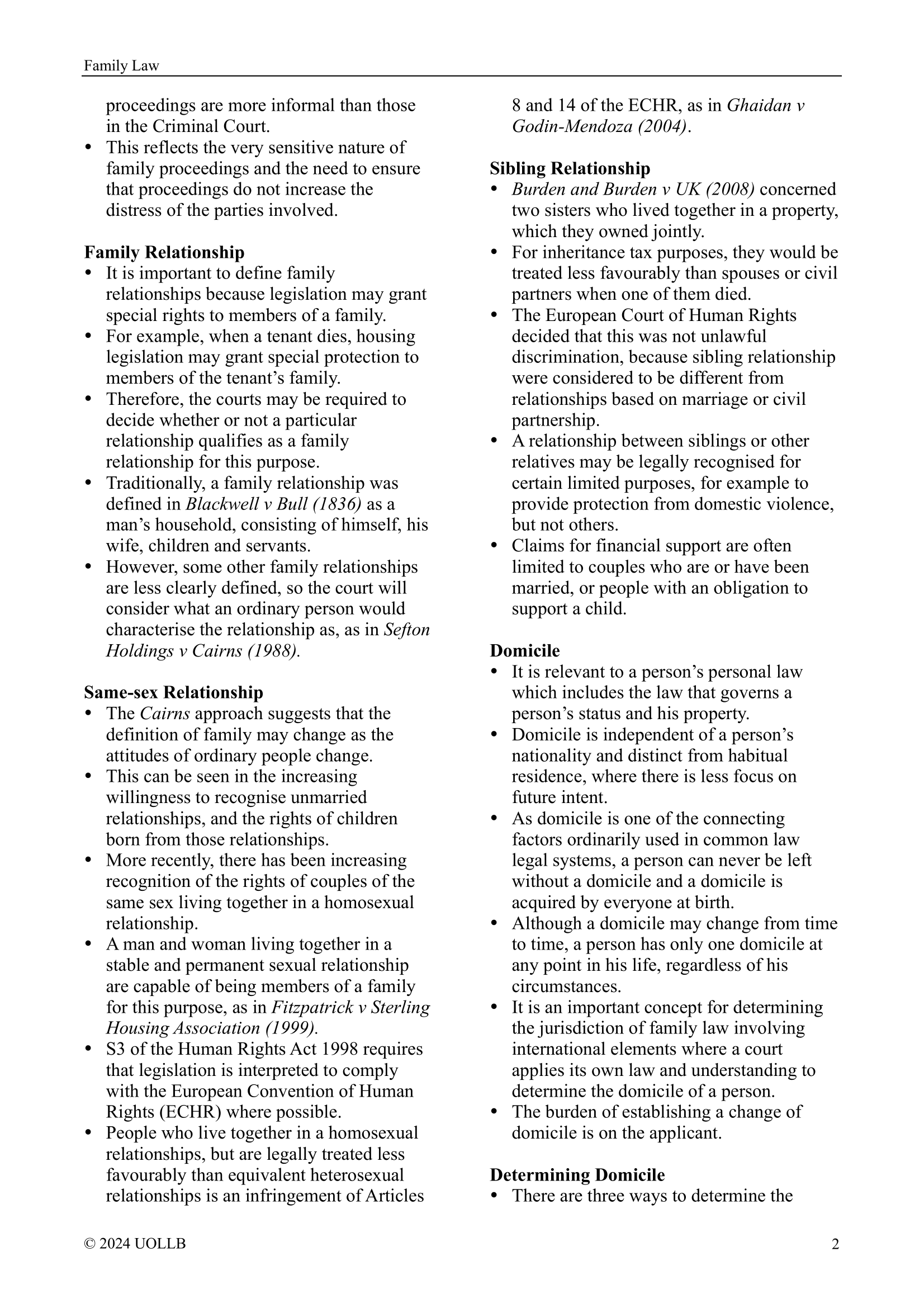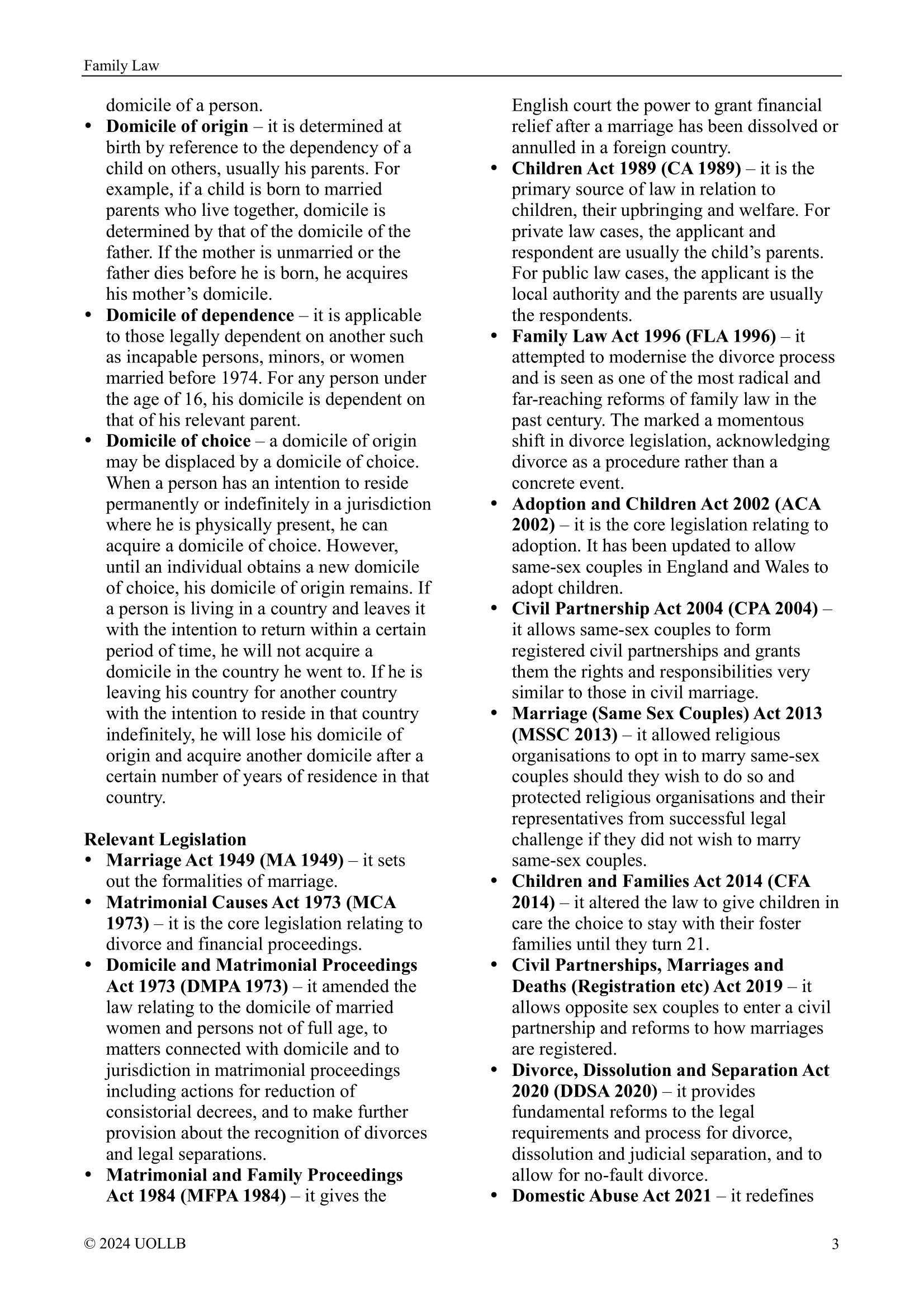Family Law deals with matters related to family relationships, including marriage, divorce, child custody, adoption, and domestic partnerships. You can select this module in Year 2. Although it is not assessed in SQE, nor is it required for entry into bar training, many intending lawyers choose to study this module because family lawyers are in high demand. Here is a summary of the topics covered in this module:
Marriage: Marriage is a legally recognised and socially sanctioned union between two individuals. It is typically based on love, mutual consent, and a desire to build a life together. Marriage provides various legal and social benefits, such as property rights, inheritance rights, tax benefits, and the ability to make medical decisions for one's spouse. While marriage traditionally referred to a union between a man and a woman, many jurisdictions now recognise and allow same-sex marriages. The requirements for a valid marriage vary by jurisdiction but often involve factors such as legal age, consent, capacity, and the absence of any legal impediments.
Civil Partnership: A civil partnership is a legal relationship that offers legal recognition and protections similar to marriage. It is typically available to both same-sex and opposite-sex couples, providing a legally recognised partnership without the traditional religious or cultural connotations of marriage. Civil partnerships grant rights and responsibilities to the partners, including property rights, financial obligations, and the ability to make decisions on behalf of each other. The requirements for a valid civil partnership also vary by jurisdiction but generally involve factors such as legal age, consent, and capacity.
Divorce: Divorce is the legal process of ending a marriage or civil partnership. It is a way for couples to legally dissolve their union and separate their lives. The process of divorce typically involves filing a legal petition, going through negotiations or court proceedings to resolve issues such as division of property, child custody, child support, and spousal support. The specific laws and procedures for divorce vary between jurisdictions, and grounds for divorce may include factors like irreconcilable differences, adultery, or abandonment.
Cohabitation: Cohabitation refers to an arrangement where two individuals live together in a domestic partnership without being married or in a civil partnership. Cohabitation can take many forms, ranging from committed long-term relationships to temporary living arrangements. While cohabitation does not carry the same legal recognition or protections as marriage or civil partnership, some jurisdictions have introduced laws to provide certain rights and responsibilities for cohabiting partners, such as property rights or financial support obligations in cases of separation.
Requirements of a Valid Marriage or Civil Partnership: The requirements for a valid marriage or civil partnership can vary depending on the jurisdiction. However, some common requirements include:
- Legal age: Both parties must meet the minimum legal age requirement to marry or enter into a civil partnership without parental consent.
- Consent: Both individuals must provide their free and voluntary consent to the marriage or civil partnership without any coercion or duress.
- Capacity: Both parties should have the mental capacity to understand the nature and consequences of the marriage or civil partnership contract.
- Monogamy: Generally, individuals must be unmarried at the time of marriage or civil partnership. Marrying more than one person at a time, known as polygamy, is not legally recognised in many countries.
- Prohibited relationships: Laws often prohibit marriages or civil partnerships between close relatives to prevent incestuous relationships and protect against genetic disorders.
Form and Capacity: Form and capacity refer to the legal requirements for a valid marriage or civil partnership. Form relates to the procedural aspects of the union, such as obtaining a marriage license or complying with specific formalities required by law. Capacity, on the other hand, pertains to the legal ability of individuals to enter into the union. This includes factors like legal age, mental capacity, and consent. Meeting the form and capacity requirements ensures that the marriage or civil partnership is legally recognised.
Nullity of Marriage: Nullity of marriage, also known as annulment, is a legal declaration that a marriage is void or invalid from its inception. It means that the marriage is considered to have never existed legally. Grounds for nullity can vary by jurisdiction but commonly include situations where there was a lack of capacity, fraud, duress, or a prohibited relationship. Nullity differs from divorce, as divorce is the dissolution of a valid marriage, whereas nullity declares the marriage null and void.
Dissolution of Civil Partnerships: Dissolution of civil partnerships is the legal process of ending a civil partnership. It is similar to divorce but applies specifically to couples in a civil partnership rather than a marriage. The dissolution process typically involves filing a legal petition and going through negotiations or court proceedings to address issues such as property division, financial arrangements, and child custody if applicable. The specific laws and procedures for dissolution of civil partnerships can vary by jurisdiction.
Judicial Separation: Judicial separation is a legal process that allows married or civilly partnered individuals to separate while remaining legally married or in a civil partnership. It is an alternative to divorce or dissolution and provides a formal recognition of the separation. Judicial separation can address issues such as division of property, financial support, and child custody arrangements. While the couple is still legally married or in a civil partnership, they no longer have the rights and obligations associated with a shared life together.
Differences between Married, Civilly Registered, and Unmarried Relationships: The differences between married, civilly registered, and unmarried relationships can vary depending on the jurisdiction. However, here are some general distinctions:
- Married: Marriage is a legally recognised union between two individuals, typically with religious or cultural significance. It provides various legal rights and obligations, such as property rights, inheritance rights, and the ability to make medical decisions for one another.
- Civilly registered: Civil partnerships or civil unions are legal relationships that offer similar legal recognition and protections as marriage. Civil partnerships may be available to both same-sex and opposite-sex couples. They provide legal rights and responsibilities, including property rights and financial obligations, without the religious or cultural connotations of marriage.
- Unmarried: Unmarried relationships refer to couples who are living together but have not entered into a legally recognised marriage or civil partnership. Unmarried couples may lack certain legal protections and rights that are automatically granted to married or civilly partnered couples. However, some jurisdictions may have laws that provide certain rights to cohabitating partners, such as property rights or financial support obligations in case of separation.
Domestic Abuse: Domestic abuse, also known as domestic violence, refers to a pattern of abusive behaviour used by one person to control and exert power over another person in a domestic or intimate relationship. It can involve physical, sexual, emotional, or psychological abuse, as well as coercive control or financial abuse. Domestic abuse can occur in various types of relationships, including marriages, cohabitation, dating relationships, and familial relationships.
Remedies for Violence, Harassment, Stalking, and Molestation: There are legal remedies available to victims of violence, harassment, stalking, and molestation. These remedies aim to protect the victims and hold the perpetrators accountable. They can include obtaining restraining orders or protection orders that prohibit the abuser from contacting or approaching the victim. Victims may also have access to civil remedies, such as pursuing a civil lawsuit for damages, or criminal remedies, where the abuser may face criminal charges and prosecution.
Orders Relating to Occupation of the Matrimonial Home: In cases of domestic abuse, legal provisions may exist to address the occupation of the matrimonial home. These provisions aim to protect victims and provide them with a safe living environment. Depending on the jurisdiction, courts may have the authority to issue orders that grant exclusive possession of the matrimonial home to the victim, excluding the abusive partner. Such orders can help ensure the safety and well-being of the victim and any children involved.
Prohibition of and Protection from Forced Marriage: Forced marriage refers to a marriage where one or both parties are married without their free and full consent. Many jurisdictions have laws in place to prohibit forced marriage and provide protection to individuals at risk. These laws may include criminalising forced marriage, providing civil remedies such as protection orders, and offering support services to those at risk or who have experienced forced marriage.
Criminal Responses to Domestic Abuse: Criminal responses to domestic abuse aim to hold perpetrators accountable for their actions. Laws vary by jurisdiction, but common criminal responses to domestic abuse can include arrest, prosecution, and penalties for offenders. Criminal charges related to domestic abuse may include assault, battery, sexual assault, harassment, stalking, or other relevant offences. The severity of the charges and potential penalties depend on the specific circumstances and applicable laws in the jurisdiction.
Financial Provision: Financial provision refers to the financial support and arrangements made for individuals, typically spouses and children, within a family law context. It involves determining how financial resources, such as income, property, and assets, are allocated and divided to meet the financial needs of the parties involved.
The Powers of the Family Court: The family court, or family law court, is a specialised court that handles cases related to family law matters. The family court has the power to make decisions and rulings on various issues, including divorce, child custody and visitation, child and spousal support, property division, and domestic violence. The court's powers include the authority to hear evidence, make findings of fact, interpret and apply relevant laws, and issue orders or judgments.
Financial Provision for Spouses and Children: Financial provision for spouses and children involves determining the financial support and maintenance obligations in cases of divorce, separation, or the dissolution of a civil partnership. It aims to ensure that both spouses and children are provided with the necessary financial resources to meet their reasonable needs. Financial provision can include spousal support or maintenance payments, child support, and the division of marital or partnership assets.
Financial Provision on Divorce: Financial provision on divorce refers to the financial arrangements made when a marriage or civil partnership is being dissolved. It involves determining how assets, debts, and financial resources accumulated during the marriage or partnership will be divided between the parties. The court may consider factors such as the length of the marriage, the parties' respective financial needs and resources, their earning capacities, and the welfare of any children involved.
Types of Family Court Orders Available: Family court orders are legal rulings issued by the court to resolve specific issues in family law cases. Some common types of family court orders include:
- Child Arrangements Order: This order determines the living arrangements, contact, and other aspects concerning a child or children involved in a family dispute, such as residence and visitation rights.
- Prohibited Steps Order: This order restricts specific actions that a parent or guardian can take regarding a child, such as changing the child's school, relocating, or making certain medical decisions.
- Specific Issue Order: This order addresses a specific issue or dispute concerning a child's upbringing or welfare, such as religious upbringing, medical treatment, or choice of school.
- Non-Molestation Order: This order provides protection from domestic violence or harassment, prohibiting a person from using or threatening violence, intimidating, or harassing another person. It can include provisions to prevent contact or approaching certain locations.
- Occupation Order: This order determines who can occupy a particular property, usually in cases of separation or divorce. It may restrict one party from entering or require them to vacate the property.
- Financial Order: This order deals with the division of assets, property, and financial arrangements following a divorce or separation. It can cover matters such as spousal maintenance, child maintenance, property transfers, and pension sharing.
- Parental Responsibility Order: This order grants parental responsibility to a person who does not automatically have it, such as an unmarried father or a step-parent. It confers legal rights and responsibilities for making decisions about a child's upbringing.
- Special Guardianship Order: This order appoints a person, often a relative or close family friend, as a child's special guardian. It grants the guardian enhanced parental responsibility, allowing them to make major decisions about the child's upbringing and providing a secure and permanent placement.
Duration and Variation of Family Court Orders: The duration of family court orders can vary depending on the specific order and the circumstances of the case. Some orders, such as child custody and support orders, may be in effect until the child reaches a certain age or until a significant change in circumstances occurs. Other orders, such as spousal support or property division orders, may have a specific duration or be subject to modification or variation based on changing circumstances, such as changes in income or financial needs.
Child Support: Child support is a financial obligation that one parent has to support his child's upbringing and well-being. It typically involves regular payments from the noncustodial parent to the custodial parent to cover the child's living expenses, education, healthcare, and other necessities. Child support is determined based on factors such as the income of both parents, the child's needs, and any applicable guidelines or formulas set by the jurisdiction.
The Law Relating to Children: The law relating to children encompasses a broad range of legal principles and provisions that govern the rights, responsibilities, and protection of children. It covers various aspects, including custody and visitation, child support, adoption, guardianship, child protection, education, healthcare, and the overall well-being and best interests of the child. The law seeks to ensure the rights and welfare of children while balancing the rights and responsibilities of parents and other parties involved.
Parent and Child: The relationship between a parent and child is a legally recognised and protected bond. Parents have legal rights and responsibilities towards their children, including the duty to provide care, support, and protection. These rights and responsibilities encompass aspects such as decision-making authority, custody and visitation rights, financial support obligations, and the right to participate in the child's upbringing and development.
Proof of Parentage: Proof of parentage refers to establishing legal parent-child relationships. It involves demonstrating the biological or legal connection between a parent and a child. Proof of parentage can be established through various means, including biological or genetic testing, marriage or civil partnership, adoption, or legal recognition through assisted reproduction technologies or surrogacy arrangements. Establishing parentage is important for determining rights and responsibilities related to custody, visitation, support, and inheritance.
Legal Aspects of Developments in Assisted Reproduction: Assisted reproduction refers to medical and technological interventions that assist individuals or couples in conceiving a child. The legal aspects of assisted reproduction encompass a range of issues, including parentage, consent, surrogacy agreements, donor rights and responsibilities, the rights of the child born through assisted reproduction, and the regulation of fertility clinics and reproductive technologies. Laws regarding assisted reproduction can vary significantly between jurisdictions, and it's important to seek legal advice to understand the specific legal provisions in your area.
Children's Rights: Children's rights are legal entitlements that protect the well-being, development, and interests of children. These rights encompass various aspects, including the right to life, survival, and development, the right to education, healthcare, and social protection, the right to be protected from abuse, exploitation, and discrimination, and the right to participate and have their views heard in matters affecting them. International conventions, such as the United Nations Convention on the Rights of the Child (UNCRC), provide a framework for children's rights, and many countries have incorporated these rights into their domestic laws.
Parental Responsibilities: Parental responsibilities refer to the legal duties and obligations that parents have towards their children. These responsibilities include providing for the child's basic needs, such as food, shelter, and clothing, as well as ensuring his safety, health, education, and general well-being. Parental responsibilities also include making decisions on behalf of the child, such as medical care, education, and religious upbringing. These responsibilities are typically conferred automatically to biological or adoptive parents but can also be granted to legal guardians or individuals with parental responsibility.
Orders under the Children Act 1989: The Children Act 1989 is a key legislation in the United Kingdom that sets out the legal framework for the protection and welfare of children. It provides for various orders that can be made by the family courts to safeguard the welfare of children. These orders include child custody and residence orders, contact orders, specific issue orders, and prohibited steps orders. These orders aim to regulate parental responsibilities and ensure that the child's best interests are protected.
The Powers of Local Authorities under the Children Act 1989: Under the Children Act 1989, local authorities are granted specific powers and responsibilities in relation to safeguarding and promoting the welfare of children. These powers include the authority to initiate child protection proceedings, conduct assessments of children and families, provide support services, and intervene in cases where there are concerns about a child's welfare or safety. Local authorities have the power to apply to the courts for care orders, supervision orders, or emergency protection orders to ensure the child's protection and well-being.
The Duties of Local Authorities under the Children Act 1989: The Children Act 1989 imposes various duties on local authorities in relation to children. These duties include providing support and services to children in need and their families, assessing the needs of children and families, making inquiries into cases of suspected child abuse or neglect, and taking appropriate action to protect children from harm. Local authorities also have a duty to promote the welfare of children in their area and work collaboratively with other agencies to ensure the best outcomes for children.
Adoption of Children: Adoption is a legal process that establishes a permanent and legally recognised parent-child relationship between individuals who are not biologically related. It involves the transfer of parental rights and responsibilities from the child's biological parents to adoptive parents. Adoption provides a stable and permanent home for children who cannot live with their birth parents, ensuring their safety, well-being, and long-term care. The adoption process typically involves assessments, background checks, and court proceedings, and it must adhere to legal requirements and safeguards to protect the best interests of the child.
Family Law aims to protect the rights and well-being of individuals within family relationships while providing a legal framework for resolving disputes and addressing the complexities that can arise in these contexts. It encompasses a wide range of legal issues that arise within families and seeks to establish legal rights, obligations, and protections for individuals within these relationships.
You can learn more about each topic and relevant case law with our exam-focused Family Law notes.






















